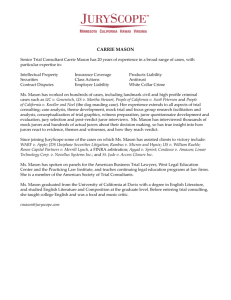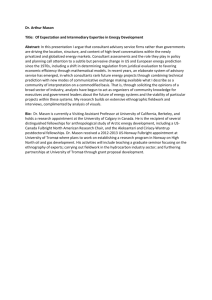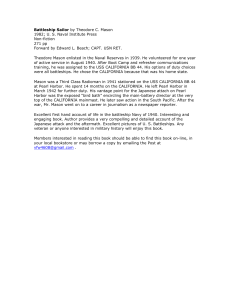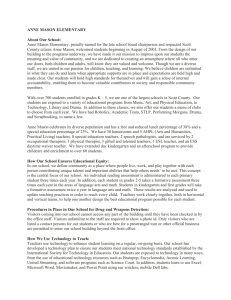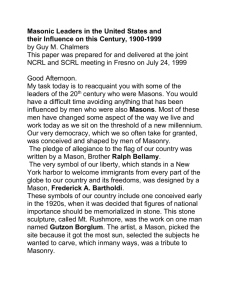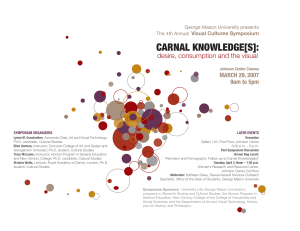Bobbie Ann Mason's New Kentucky Home
advertisement
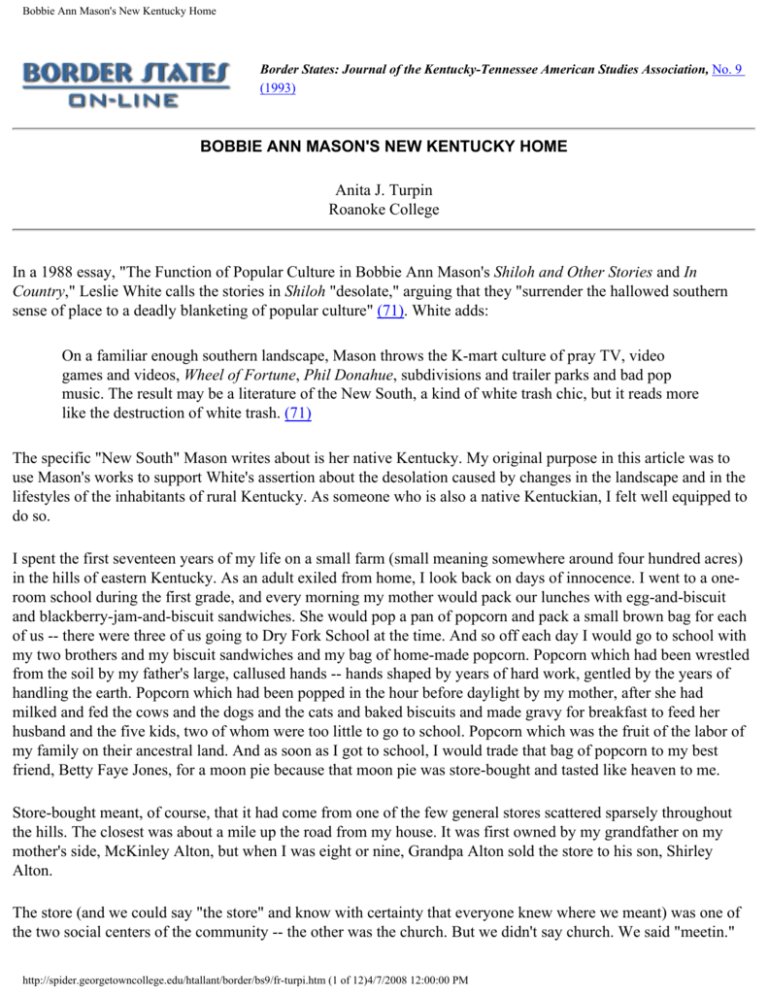
Bobbie Ann Mason's New Kentucky Home Border States: Journal of the Kentucky-Tennessee American Studies Association, No. 9 (1993) BOBBIE ANN MASON'S NEW KENTUCKY HOME Anita J. Turpin Roanoke College In a 1988 essay, "The Function of Popular Culture in Bobbie Ann Mason's Shiloh and Other Stories and In Country," Leslie White calls the stories in Shiloh "desolate," arguing that they "surrender the hallowed southern sense of place to a deadly blanketing of popular culture" (71). White adds: On a familiar enough southern landscape, Mason throws the K-mart culture of pray TV, video games and videos, Wheel of Fortune, Phil Donahue, subdivisions and trailer parks and bad pop music. The result may be a literature of the New South, a kind of white trash chic, but it reads more like the destruction of white trash. (71) The specific "New South" Mason writes about is her native Kentucky. My original purpose in this article was to use Mason's works to support White's assertion about the desolation caused by changes in the landscape and in the lifestyles of the inhabitants of rural Kentucky. As someone who is also a native Kentuckian, I felt well equipped to do so. I spent the first seventeen years of my life on a small farm (small meaning somewhere around four hundred acres) in the hills of eastern Kentucky. As an adult exiled from home, I look back on days of innocence. I went to a oneroom school during the first grade, and every morning my mother would pack our lunches with egg-and-biscuit and blackberry-jam-and-biscuit sandwiches. She would pop a pan of popcorn and pack a small brown bag for each of us -- there were three of us going to Dry Fork School at the time. And so off each day I would go to school with my two brothers and my biscuit sandwiches and my bag of home-made popcorn. Popcorn which had been wrestled from the soil by my father's large, callused hands -- hands shaped by years of hard work, gentled by the years of handling the earth. Popcorn which had been popped in the hour before daylight by my mother, after she had milked and fed the cows and the dogs and the cats and baked biscuits and made gravy for breakfast to feed her husband and the five kids, two of whom were too little to go to school. Popcorn which was the fruit of the labor of my family on their ancestral land. And as soon as I got to school, I would trade that bag of popcorn to my best friend, Betty Faye Jones, for a moon pie because that moon pie was store-bought and tasted like heaven to me. Store-bought meant, of course, that it had come from one of the few general stores scattered sparsely throughout the hills. The closest was about a mile up the road from my house. It was first owned by my grandfather on my mother's side, McKinley Alton, but when I was eight or nine, Grandpa Alton sold the store to his son, Shirley Alton. The store (and we could say "the store" and know with certainty that everyone knew where we meant) was one of the two social centers of the community -- the other was the church. But we didn't say church. We said "meetin." http://spider.georgetowncollege.edu/htallant/border/bs9/fr-turpi.htm (1 of 12)4/7/2008 12:00:00 PM Bobbie Ann Mason's New Kentucky Home We went to "meeting' every Saturday night and every Sunday morning except for revival in the summer, when we went to "revival" every morning and every evening, for one week if no one was heeding the call and being saved from eternal damnation in the fiery pits of hell, or rededicating their lives, and two weeks if hell was scaring lots of sinners and backsliders into coming forward. Meetin was also the primary location for dating and mating activity. The center row of benches was reserved for courting couples, and to move into that center row was to make a declaration of intentions one could not easily get out of. I look back on that time and I hear the laughter of healthy, happy children living lives of simplicity and goodness. They view moon-pies as the ultimate in consumer satisfaction, and look with some awe on families decadent enough to buy a box of each kind, the chocolate, the vanilla, and the banana. They mind their parents; they are respectful to all adults. They go to Sunday school and meeting, and take a certain glee in c heating the grown-ups and God by memorizing the shortest Bible verse in the Bible -- "Jesus wept" -- to repeat in Sunday school, and thereby add to the number of memorized verses posted each Sunday on the wall at the front of the church. They do their schoolwork in the evening and go to bed before dark because the local radio station is off the air at 5:30 p.m. and there's no reason to listen any longer unless the Wildcats are playing, and you have an FM radio strong enough to pull in the radio waves over the hills from Lexington. And, of course, there's no TV. A TV costs a fourth of the annual income from the tobacco crop, and it's the instrument of the devil anyway, as Brother Lonzo Mitchell was always warning us from the pulpit of the Cedar Hill Baptist Church. I see myself as one of those children, and I think, "How wonderful it would be if I could recapture that sense of certainty and innocence." And I think, "How awful that, today, the children in that community of eastern Kentucky are watching Madonna on MTV and the Simpsons on Fox and buying their moon pies at Wal-Mart instead of 'the store.' How awful that they're telling their parents, "Don't have a cow, man!" or "Kowabunga, Dude." How awful that they can't identify by sight Hulk Hogan and Andre the Giant and Gorgeous George. But in the midst of my pious platitudes about the corruption, the decline, the destruction of my pastoral paradise, I am struck by a sense of unease, a trickling of a memory of wanting desperately as a child to walk on a sidewalk to school, to go to a library which wasn't located in a room in the county courthouse, a room permeated by the urine smell of the jail and surrounded by concrete halls, land-mined with clumps of chewed "baccer" on the floors. I wanted to see the ocean. I wanted to ride on a city bus, on a boat, on a plane. I wanted to eat something besides biscuits and gravy and cornbread and pinto beans. In fact, I grew up much like Bobbie Ann Mason, although she was on one side of the state and I was on the other. And even though she was sixteen years older than me, the western part of Kentucky has always been considerably more progressive than the eastern so, if anything, my childhood was even more "isolated" than she recalls hers having been. In a 1986 interview, she recounts that, growing up, her "basic experience was isolation and a desire to get out of the isolation" (Wilhelm 27). And just as I did, she fed her starving mind by reading Nancy Drew books, and before that the Bobbsey Twins. In that same interview, she reveals that the Bobbsey Twins were one of the biggest influences on her life because they "got to go on a vacation in every single book" and her family never did (29). Neither did mine, or anyone else's I knew. I started this project a few months ago identifying deeply with those critics who decry the empty lives of the Mason characters. I told myself how accurate those critics are, and how sad that accuracy is, because the advent of shopping centers, of rampant consumerism rang the death knell on that idyllic rural Kentucky life enshrined in my golden memories. But Mason's work refuses to be dismissed that easily; it rejects a facile romanticization, or an easy slide into the nostalgic. References to those encroaching malls and shopping centers, filled with chain stores, do pervade Mason's fiction. http://spider.georgetowncollege.edu/htallant/border/bs9/fr-turpi.htm (2 of 12)4/7/2008 12:00:00 PM Bobbie Ann Mason's New Kentucky Home Many of the characters work at t hem, particularly the female characters. For example, in "Shiloh," Norma Jean works at the cosmetics counter at Rexall. Louise from "Still Life with Watermelon" has just lost her job at Krogers and her friend, Peggy, works at customer service in K-Mart. Linda in "Old Things" works at K-Mart. Carolyn in "Drawing Names" works at J.C. Penney. In "Love Life" Velma, who is wearing "a plum-colored print blouse and a plum skirt and a little green scarf with a gold pin holding it down," comes home from her job at Shop World (3). Barbara in "The Secret of the Pyramids" works in Children's Wear in a department store at the mall, and her friend, Glenda, works in Housewares. Barbara has been having an affair with Bob, who owns a shoe store at the mall. Some of Mason's male characters have also found work at the shopping centers and malls. In "Airwaves," Coy gets a job as a floorwalker at Wal-Mart. When his girlfriend Jane goes to see him at work, she finds him "patrolling the pet department. In his brown plaid pants, blue shirt, and yellow tie, he looked stylish and comfortable, as though he had finally found a place where he belonged. He seemed like a man whose ambition was to get a service award so he could have his picture in the paper, shaking hands with his boss" (195). In addition to offering jobs, the shopping centers and malls serve as a consumer haven and social outlet. Dean from "Piano Fingers" takes his daughter to Wal-Mart to buy her a keyboard so she can practice her piano lessons at home (97). In "Big Bertha Stories," the last time Donald came home on his rare visits from working at the strip mines in Central City, he and his wife Jeanette and their son Rodney went to the shopping center to buy shoes for Rodney: "They stayed at the shopping center half the afternoon, just looking around. Donald and Rodney played video games. [For once] Jeanette felt they were a normal family" (116-17). In "Coyotes," Cobb, who is twenty-eight years old, has a new girlfriend, Lynette, who makes hi m see "that anything conventional -- Friday night strolls at the mall or an assortment of baked-potato toppings at a restaurant -was funny and absurd" (164). As Cobb's comment reveals, the malls and shopping centers have become the conventional center of social activity. In the story "Marita," the title character, who works at the off-price mall, tells about going out on a date with " a guy who works at the mall" as a sales manager; Marita says he was ashamed to be seen with her because of what she was wearing. She adds, "Around here, if you don't wear coordinated pastel polyester, people look at you funny. He's got a wrong impression of me from the clothes I was forced to wear at the Paycheck Discount" (61). When her date stops at the mall to buy a battery, he suggests to Marita that she wait in the car. In "Sorghum," Liz, who works at the discount store, goes to the mall with her date, Ed. They check out the stereo components in Radio Shack and have their pictures taken in wild west costumes at a booth. Then Ed takes Liz to a restaurant in the mall and with a casual extravagance and sophistication that she admires tells her to "order anything you want" (204). Liz is married, but not to Ed, and she tells Ed as they sit eating in the mall that her husband doesn't take her out to eat like this -- "his idea of going out to eat is McDonald's" (205). Liz continues to meet Ed occasionally at the mall as a prelude to going back to his place. When she goes away for a weekend with Ed, she tells her husband that she is going with her friend Faye to "a place down in Tennessee where you can go to a mall that's nothing but factory outlets" (208). Her husband says, "Fine... If you can get a good price on some 501 jeans, I need a pair" (208). Sam in In Country agrees to have a coke "at a booth in the rear of the K-Mart" with one of her Uncle Emmett's fairly lecherous Vietnam buddies, Pete Simms, because she is thirsty and because "he couldn't try anything funny in the K-Mart" (133). Besides being a setting for romantic encounters, malls and shopping centers and discount department stores also furnish social activities for family groups, as with Jeanette, Donald and Rodney from "Big Bertha Stories." Joe, in http://spider.georgetowncollege.edu/htallant/border/bs9/fr-turpi.htm (3 of 12)4/7/2008 12:00:00 PM Bobbie Ann Mason's New Kentucky Home the story "Memphis," has come to pick up his kids for the weekend, promising them, "We'll go to the mall afterawhile" (220). In Mason's fiction, as in real-life Kentucky, Uncle Shirley's store has been replaced by Wal-Mart. The truth of the matter is, however, that the old general store didn't have much, and what it did have was generally overpriced. By the same token, the courting section at church has been replaced by a stroll through Radio Shack and dinner at Chick Fil-A. But the small country church in my eastern Kentucky community was pretty oppressive -- not very tolerant of human weaknesses or mistakes. As a divorced woman, I would not be allowed to go into the church building, should I ever want to go back. Mason often defends her characters from what critics call their "bleak and depressing lives" (Gholson 40). For example, Linda Adams Barnes calls Mason's characters "freaks...being forced to conform to untraditional lifestyles" (141). Mason argues that while the characters of her work may be caught in the midst of tremendous social and/or cultural change, the change offers possibility for growth rather than a retreat into the grotesque or freakish. And I think she is right when she says the criticism is sometimes motivated by a combination of class distinctions and nostalgia for the "simpler time" which Mason argues was "full of hardship." She states: "I think the romantic view is that people would be telling stories and making their own music and having fellowship. The reality might be that people had to put up with each other a lot more" (Gholson 42). She also defends her characters from elitist class distinctions because they talk a plain style of language that "conveys an attitude ... about the world that's not layered over with a veneer of polite society or Southern Hospitality" (Gholson 42). In addition to their being plain speakers, Mason believes her characters contain a lot of energy "because they're not jaded. They're not really disillusioned yet. A lot of them are holding on to the tag end of the American Dream" (Gholson 42). And part of that dream is having a job with a steady income. Part of that dream is being able to afford to buy electronic keyboards and Atari games, or new shoes. A scene near the end of In Country always jerks me out of my own inclination to drift into a nostalgic reverie about my childhood in Kentucky. In the scene, Sam drives over the back roads to visit her father's parents' farm to get a diary he had kept in Vietnam before he was killed. Passing old farms and country graveyards and "new house trailers perched on blocks in bare fields," she finally gets to the narrow land leading to the farm (192). She hasn't seen her grandparents in two years. She has dinner with them (dinner is the mid-day meal in Kentucky). During dinner, Sam's Aunt Donna and Mamaw talk about Donna's husband's sister who has just moved into a new brick house with "all its appliances...[and] a video-cassette recorder and a bedroom suit that cost a thousand dollars" (195). After dinner, Sam walks over the farm, consciously trying to "see" the place where her father grew up, to see it the way he would have seen it and remembered it while he was in Vietnam. She walks through the fields along the fence rows, picking wildflowers, and then goes down to the creek before returning to the house. Mamaw has found the diary and gives it to Sam. Although Sam had originally planned to spend the night with her grandparents, she makes a sudden decision to leave. With a Coke and some chocolate-chip cookies, she sits "on a bench beside some plants at the center of the two wings of the mall" and discovers that in Vietnam her father "smoked and drank and murdered" (205). As Sam drives home from the mall she angrily rejects her father and all his family, the whole Hughes clan: They were ignorant and country anyway. They lived in that old farmhouse with the decayed smell she always remembered it having -- the smell of dirty farm clothes, soiled with cow manure. In their bathroom earlier, she had almost slipped on the sodden rug that lay rotting around the http://spider.georgetowncollege.edu/htallant/border/bs9/fr-turpi.htm (4 of 12)4/7/2008 12:00:00 PM Bobbie Ann Mason's New Kentucky Home sweating commode. In the living room, the television was missing a leg, and a complicated old antenna -- all claws and a fan of rods -- sat in a corner, looking like a monster from outer space. The contraption was an effort to pick up cable so that Pap could catch the Wildcats' basketball games. Mamaw picked peas in a rusty bucket with a rag plug stopping up a hole. (206) Sam has discovered that her father, whom she has known only through pictures of a young, awkward boy, truly suffered, that the horrors of Vietnam were much worse than she could ever have imagined, even with her "morbid" imagination. Her rejection of his suffering leads to her rejection of him and his family and their decaying farmhouse with its smells of manure and dirt and sweat. The fact that she seeks refuge in the mall to read the diary does not surprise me -- it is Ernest Hemingway's "clean, well-lighted place" writ large. Nor is it surprising that her Aunt Donna speaks longingly of a new brick house full of modern appliances. What the mall offers, what the new brick house offers, is an escape from an environment that is sometimes unbearable. Sure, there are wildflowers and creeks with wild goose-plum trees and honeysuckle vines, but there are also mangy dogs and rot and decay. This scene forces me to acknowledge that the rural Kentucky of my past was not always a pastoral paradise. I remember family dinners where folks were "telling stories and making their own music and having fellowship." But I also remember rusty buckets and cow manure and being shut out of "fellowship" because of my gender. What I discovered in my journey through Mason's works and into my own past over the last few months was that I do not finally agree with the critics who have single-mindedly lamented the encroachment of the modern world into an agrarian Kentucky paradise. Rather, I think I agree with Mason when she says that for her characters, "for all of them, the oldest to the youngest, the world is opening up in both promising and disappointing ways" (Wilhelm 38). Of course, I am ever conscious of the possibility that I've been seduced by the blue light special, the possibility that I'm still trading my bag of popcorn for a moon pie. WORKS CITED Barnes, Linda Adams. "The Freak Endures: The Southern Grotesque from Flannery O'Connor to Bobbie Ann Mason." Since Flannery O'Connor: Essays on the Contemporary American Short Story. Macomb, Illinois: Western Illinois UP, 1987. 133-141. Gholson, Craig. "Bobbie Ann Mason." Bomb 28 (Summer 1989): 40-43. Mason, Bobbie Ann. "Airwaves." Love Life 180-197. -----. "Big Bertha Stories." Love Life 116-132. -----. "Coyotes." Love Life 161-179. -----. "Drawing Names." Shiloh and Other Stories 94-108. -----. In Country. New York: Harper & Row, 1985. -----. Love Life. New York: Harper & Row, 1989. -----. "Love Life." Love Life 1-18. http://spider.georgetowncollege.edu/htallant/border/bs9/fr-turpi.htm (5 of 12)4/7/2008 12:00:00 PM Bobbie Ann Mason's New Kentucky Home -----. "Marita." Love Life 54-67. -----. "Memphis." Love Life 214-232. -----. "Old Things." Shiloh and Other Stories 75-93. -----. "Piano Fingers." Love Life 82-98. -----. "The Secret of the Pyramids." Love Life 68-81. -----. "Shiloh." Shiloh and Other Stories 1-16. -----. Shiloh and Other Stories. New York: Harper & Row, 1982. -----. "Sorghum." Love Life 198-213. -----. "Still Life with Watermelon." Shiloh and Other Stories 60-74. White, Leslie. "The Function of Popular Culture in Bobbie Ann Mason's Shiloh and Other Stories and In Country." The Southern Quarterly 26.4 (Summer 1988): 69-79. Wilhelm, Albert. "An Interview with Bobbie Ann Mason." The Southern Quarterly 26.2 (Winter 1988): 27-38. Copyright © 1993, 1999, Middle Tennessee State University. Border States On-Line is hosted by Georgetown College. This page was last updated on 5/14/99. | Border States On-Line | Site Map This web page is maintained by Dr. Harold D. Tallant, Department of History, Georgetown College 400 East College Street, Georgetown, KY 40324, (502) 863-8075 E-mail: htallant@georgetowncollege.edu Border States: Journal of the Kentucky-Tennessee American Studies Association, No. 9 (1993) BOBBIE ANN MASON'S NEW KENTUCKY HOME Anita J. Turpin http://spider.georgetowncollege.edu/htallant/border/bs9/fr-turpi.htm (6 of 12)4/7/2008 12:00:00 PM Bobbie Ann Mason's New Kentucky Home Roanoke College In a 1988 essay, "The Function of Popular Culture in Bobbie Ann Mason's Shiloh and Other Stories and In Country," Leslie White calls the stories in Shiloh "desolate," arguing that they "surrender the hallowed southern sense of place to a deadly blanketing of popular culture" (71). White adds: On a familiar enough southern landscape, Mason throws the K-mart culture of pray TV, video games and videos, Wheel of Fortune, Phil Donahue, subdivisions and trailer parks and bad pop music. The result may be a literature of the New South, a kind of white trash chic, but it reads more like the destruction of white trash. (71) The specific "New South" Mason writes about is her native Kentucky. My original purpose in this article was to use Mason's works to support White's assertion about the desolation caused by changes in the landscape and in the lifestyles of the inhabitants of rural Kentucky. As someone who is also a native Kentuckian, I felt well equipped to do so. I spent the first seventeen years of my life on a small farm (small meaning somewhere around four hundred acres) in the hills of eastern Kentucky. As an adult exiled from home, I look back on days of innocence. I went to a oneroom school during the first grade, and every morning my mother would pack our lunches with egg-and-biscuit and blackberry-jam-and-biscuit sandwiches. She would pop a pan of popcorn and pack a small brown bag for each of us -- there were three of us going to Dry Fork School at the time. And so off each day I would go to school with my two brothers and my biscuit sandwiches and my bag of home-made popcorn. Popcorn which had been wrestled from the soil by my father's large, callused hands -- hands shaped by years of hard work, gentled by the years of handling the earth. Popcorn which had been popped in the hour before daylight by my mother, after she had milked and fed the cows and the dogs and the cats and baked biscuits and made gravy for breakfast to feed her husband and the five kids, two of whom were too little to go to school. Popcorn which was the fruit of the labor of my family on their ancestral land. And as soon as I got to school, I would trade that bag of popcorn to my best friend, Betty Faye Jones, for a moon pie because that moon pie was store-bought and tasted like heaven to me. Store-bought meant, of course, that it had come from one of the few general stores scattered sparsely throughout the hills. The closest was about a mile up the road from my house. It was first owned by my grandfather on my mother's side, McKinley Alton, but when I was eight or nine, Grandpa Alton sold the store to his son, Shirley Alton. The store (and we could say "the store" and know with certainty that everyone knew where we meant) was one of the two social centers of the community -- the other was the church. But we didn't say church. We said "meetin." We went to "meeting' every Saturday night and every Sunday morning except for revival in the summer, when we went to "revival" every morning and every evening, for one week if no one was heeding the call and being saved from eternal damnation in the fiery pits of hell, or rededicating their lives, and two weeks if hell was scaring lots of sinners and backsliders into coming forward. Meetin was also the primary location for dating and mating activity. The center row of benches was reserved for courting couples, and to move into that center row was to make a declaration of intentions one could not easily get out of. I look back on that time and I hear the laughter of healthy, happy children living lives of simplicity and goodness. They view moon-pies as the ultimate in consumer satisfaction, and look with some awe on families decadent http://spider.georgetowncollege.edu/htallant/border/bs9/fr-turpi.htm (7 of 12)4/7/2008 12:00:00 PM Bobbie Ann Mason's New Kentucky Home enough to buy a box of each kind, the chocolate, the vanilla, and the banana. They mind their parents; they are respectful to all adults. They go to Sunday school and meeting, and take a certain glee in c heating the grown-ups and God by memorizing the shortest Bible verse in the Bible -- "Jesus wept" -- to repeat in Sunday school, and thereby add to the number of memorized verses posted each Sunday on the wall at the front of the church. They do their schoolwork in the evening and go to bed before dark because the local radio station is off the air at 5:30 p.m. and there's no reason to listen any longer unless the Wildcats are playing, and you have an FM radio strong enough to pull in the radio waves over the hills from Lexington. And, of course, there's no TV. A TV costs a fourth of the annual income from the tobacco crop, and it's the instrument of the devil anyway, as Brother Lonzo Mitchell was always warning us from the pulpit of the Cedar Hill Baptist Church. I see myself as one of those children, and I think, "How wonderful it would be if I could recapture that sense of certainty and innocence." And I think, "How awful that, today, the children in that community of eastern Kentucky are watching Madonna on MTV and the Simpsons on Fox and buying their moon pies at Wal-Mart instead of 'the store.' How awful that they're telling their parents, "Don't have a cow, man!" or "Kowabunga, Dude." How awful that they can't identify by sight Hulk Hogan and Andre the Giant and Gorgeous George. But in the midst of my pious platitudes about the corruption, the decline, the destruction of my pastoral paradise, I am struck by a sense of unease, a trickling of a memory of wanting desperately as a child to walk on a sidewalk to school, to go to a library which wasn't located in a room in the county courthouse, a room permeated by the urine smell of the jail and surrounded by concrete halls, land-mined with clumps of chewed "baccer" on the floors. I wanted to see the ocean. I wanted to ride on a city bus, on a boat, on a plane. I wanted to eat something besides biscuits and gravy and cornbread and pinto beans. In fact, I grew up much like Bobbie Ann Mason, although she was on one side of the state and I was on the other. And even though she was sixteen years older than me, the western part of Kentucky has always been considerably more progressive than the eastern so, if anything, my childhood was even more "isolated" than she recalls hers having been. In a 1986 interview, she recounts that, growing up, her "basic experience was isolation and a desire to get out of the isolation" (Wilhelm 27). And just as I did, she fed her starving mind by reading Nancy Drew books, and before that the Bobbsey Twins. In that same interview, she reveals that the Bobbsey Twins were one of the biggest influences on her life because they "got to go on a vacation in every single book" and her family never did (29). Neither did mine, or anyone else's I knew. I started this project a few months ago identifying deeply with those critics who decry the empty lives of the Mason characters. I told myself how accurate those critics are, and how sad that accuracy is, because the advent of shopping centers, of rampant consumerism rang the death knell on that idyllic rural Kentucky life enshrined in my golden memories. But Mason's work refuses to be dismissed that easily; it rejects a facile romanticization, or an easy slide into the nostalgic. References to those encroaching malls and shopping centers, filled with chain stores, do pervade Mason's fiction. Many of the characters work at t hem, particularly the female characters. For example, in "Shiloh," Norma Jean works at the cosmetics counter at Rexall. Louise from "Still Life with Watermelon" has just lost her job at Krogers and her friend, Peggy, works at customer service in K-Mart. Linda in "Old Things" works at K-Mart. Carolyn in "Drawing Names" works at J.C. Penney. In "Love Life" Velma, who is wearing "a plum-colored print blouse and a plum skirt and a little green scarf with a gold pin holding it down," comes home from her job at Shop World (3). Barbara in "The Secret of the Pyramids" works in Children's Wear in a department store at the mall, and her friend, Glenda, works in Housewares. Barbara has been having an affair with Bob, who owns a shoe store at the mall. Some of Mason's male characters have also found work at the shopping centers and malls. In "Airwaves," Coy gets http://spider.georgetowncollege.edu/htallant/border/bs9/fr-turpi.htm (8 of 12)4/7/2008 12:00:00 PM Bobbie Ann Mason's New Kentucky Home a job as a floorwalker at Wal-Mart. When his girlfriend Jane goes to see him at work, she finds him "patrolling the pet department. In his brown plaid pants, blue shirt, and yellow tie, he looked stylish and comfortable, as though he had finally found a place where he belonged. He seemed like a man whose ambition was to get a service award so he could have his picture in the paper, shaking hands with his boss" (195). In addition to offering jobs, the shopping centers and malls serve as a consumer haven and social outlet. Dean from "Piano Fingers" takes his daughter to Wal-Mart to buy her a keyboard so she can practice her piano lessons at home (97). In "Big Bertha Stories," the last time Donald came home on his rare visits from working at the strip mines in Central City, he and his wife Jeanette and their son Rodney went to the shopping center to buy shoes for Rodney: "They stayed at the shopping center half the afternoon, just looking around. Donald and Rodney played video games. [For once] Jeanette felt they were a normal family" (116-17). In "Coyotes," Cobb, who is twenty-eight years old, has a new girlfriend, Lynette, who makes hi m see "that anything conventional -- Friday night strolls at the mall or an assortment of baked-potato toppings at a restaurant -was funny and absurd" (164). As Cobb's comment reveals, the malls and shopping centers have become the conventional center of social activity. In the story "Marita," the title character, who works at the off-price mall, tells about going out on a date with " a guy who works at the mall" as a sales manager; Marita says he was ashamed to be seen with her because of what she was wearing. She adds, "Around here, if you don't wear coordinated pastel polyester, people look at you funny. He's got a wrong impression of me from the clothes I was forced to wear at the Paycheck Discount" (61). When her date stops at the mall to buy a battery, he suggests to Marita that she wait in the car. In "Sorghum," Liz, who works at the discount store, goes to the mall with her date, Ed. They check out the stereo components in Radio Shack and have their pictures taken in wild west costumes at a booth. Then Ed takes Liz to a restaurant in the mall and with a casual extravagance and sophistication that she admires tells her to "order anything you want" (204). Liz is married, but not to Ed, and she tells Ed as they sit eating in the mall that her husband doesn't take her out to eat like this -- "his idea of going out to eat is McDonald's" (205). Liz continues to meet Ed occasionally at the mall as a prelude to going back to his place. When she goes away for a weekend with Ed, she tells her husband that she is going with her friend Faye to "a place down in Tennessee where you can go to a mall that's nothing but factory outlets" (208). Her husband says, "Fine... If you can get a good price on some 501 jeans, I need a pair" (208). Sam in In Country agrees to have a coke "at a booth in the rear of the K-Mart" with one of her Uncle Emmett's fairly lecherous Vietnam buddies, Pete Simms, because she is thirsty and because "he couldn't try anything funny in the K-Mart" (133). Besides being a setting for romantic encounters, malls and shopping centers and discount department stores also furnish social activities for family groups, as with Jeanette, Donald and Rodney from "Big Bertha Stories." Joe, in the story "Memphis," has come to pick up his kids for the weekend, promising them, "We'll go to the mall afterawhile" (220). In Mason's fiction, as in real-life Kentucky, Uncle Shirley's store has been replaced by Wal-Mart. The truth of the matter is, however, that the old general store didn't have much, and what it did have was generally overpriced. By the same token, the courting section at church has been replaced by a stroll through Radio Shack and dinner at Chick Fil-A. But the small country church in my eastern Kentucky community was pretty oppressive -- not very tolerant of human weaknesses or mistakes. As a divorced woman, I would not be allowed to go into the church building, should I ever want to go back. http://spider.georgetowncollege.edu/htallant/border/bs9/fr-turpi.htm (9 of 12)4/7/2008 12:00:00 PM Bobbie Ann Mason's New Kentucky Home Mason often defends her characters from what critics call their "bleak and depressing lives" (Gholson 40). For example, Linda Adams Barnes calls Mason's characters "freaks...being forced to conform to untraditional lifestyles" (141). Mason argues that while the characters of her work may be caught in the midst of tremendous social and/or cultural change, the change offers possibility for growth rather than a retreat into the grotesque or freakish. And I think she is right when she says the criticism is sometimes motivated by a combination of class distinctions and nostalgia for the "simpler time" which Mason argues was "full of hardship." She states: "I think the romantic view is that people would be telling stories and making their own music and having fellowship. The reality might be that people had to put up with each other a lot more" (Gholson 42). She also defends her characters from elitist class distinctions because they talk a plain style of language that "conveys an attitude ... about the world that's not layered over with a veneer of polite society or Southern Hospitality" (Gholson 42). In addition to their being plain speakers, Mason believes her characters contain a lot of energy "because they're not jaded. They're not really disillusioned yet. A lot of them are holding on to the tag end of the American Dream" (Gholson 42). And part of that dream is having a job with a steady income. Part of that dream is being able to afford to buy electronic keyboards and Atari games, or new shoes. A scene near the end of In Country always jerks me out of my own inclination to drift into a nostalgic reverie about my childhood in Kentucky. In the scene, Sam drives over the back roads to visit her father's parents' farm to get a diary he had kept in Vietnam before he was killed. Passing old farms and country graveyards and "new house trailers perched on blocks in bare fields," she finally gets to the narrow land leading to the farm (192). She hasn't seen her grandparents in two years. She has dinner with them (dinner is the mid-day meal in Kentucky). During dinner, Sam's Aunt Donna and Mamaw talk about Donna's husband's sister who has just moved into a new brick house with "all its appliances...[and] a video-cassette recorder and a bedroom suit that cost a thousand dollars" (195). After dinner, Sam walks over the farm, consciously trying to "see" the place where her father grew up, to see it the way he would have seen it and remembered it while he was in Vietnam. She walks through the fields along the fence rows, picking wildflowers, and then goes down to the creek before returning to the house. Mamaw has found the diary and gives it to Sam. Although Sam had originally planned to spend the night with her grandparents, she makes a sudden decision to leave. With a Coke and some chocolate-chip cookies, she sits "on a bench beside some plants at the center of the two wings of the mall" and discovers that in Vietnam her father "smoked and drank and murdered" (205). As Sam drives home from the mall she angrily rejects her father and all his family, the whole Hughes clan: They were ignorant and country anyway. They lived in that old farmhouse with the decayed smell she always remembered it having -- the smell of dirty farm clothes, soiled with cow manure. In their bathroom earlier, she had almost slipped on the sodden rug that lay rotting around the sweating commode. In the living room, the television was missing a leg, and a complicated old antenna -- all claws and a fan of rods -- sat in a corner, looking like a monster from outer space. The contraption was an effort to pick up cable so that Pap could catch the Wildcats' basketball games. Mamaw picked peas in a rusty bucket with a rag plug stopping up a hole. (206) Sam has discovered that her father, whom she has known only through pictures of a young, awkward boy, truly suffered, that the horrors of Vietnam were much worse than she could ever have imagined, even with her "morbid" imagination. Her rejection of his suffering leads to her rejection of him and his family and their decaying farmhouse with its smells of manure and dirt and sweat. The fact that she seeks refuge in the mall to read the diary does not surprise me -- it is Ernest Hemingway's "clean, well-lighted place" writ large. Nor is it surprising that her http://spider.georgetowncollege.edu/htallant/border/bs9/fr-turpi.htm (10 of 12)4/7/2008 12:00:00 PM Bobbie Ann Mason's New Kentucky Home Aunt Donna speaks longingly of a new brick house full of modern appliances. What the mall offers, what the new brick house offers, is an escape from an environment that is sometimes unbearable. Sure, there are wildflowers and creeks with wild goose-plum trees and honeysuckle vines, but there are also mangy dogs and rot and decay. This scene forces me to acknowledge that the rural Kentucky of my past was not always a pastoral paradise. I remember family dinners where folks were "telling stories and making their own music and having fellowship." But I also remember rusty buckets and cow manure and being shut out of "fellowship" because of my gender. What I discovered in my journey through Mason's works and into my own past over the last few months was that I do not finally agree with the critics who have single-mindedly lamented the encroachment of the modern world into an agrarian Kentucky paradise. Rather, I think I agree with Mason when she says that for her characters, "for all of them, the oldest to the youngest, the world is opening up in both promising and disappointing ways" (Wilhelm 38). Of course, I am ever conscious of the possibility that I've been seduced by the blue light special, the possibility that I'm still trading my bag of popcorn for a moon pie. WORKS CITED Barnes, Linda Adams. "The Freak Endures: The Southern Grotesque from Flannery O'Connor to Bobbie Ann Mason." Since Flannery O'Connor: Essays on the Contemporary American Short Story. Macomb, Illinois: Western Illinois UP, 1987. 133-141. Gholson, Craig. "Bobbie Ann Mason." Bomb 28 (Summer 1989): 40-43. Mason, Bobbie Ann. "Airwaves." Love Life 180-197. -----. "Big Bertha Stories." Love Life 116-132. -----. "Coyotes." Love Life 161-179. -----. "Drawing Names." Shiloh and Other Stories 94-108. -----. In Country. New York: Harper & Row, 1985. -----. Love Life. New York: Harper & Row, 1989. -----. "Love Life." Love Life 1-18. -----. "Marita." Love Life 54-67. -----. "Memphis." Love Life 214-232. -----. "Old Things." Shiloh and Other Stories 75-93. -----. "Piano Fingers." Love Life 82-98. http://spider.georgetowncollege.edu/htallant/border/bs9/fr-turpi.htm (11 of 12)4/7/2008 12:00:00 PM Bobbie Ann Mason's New Kentucky Home -----. "The Secret of the Pyramids." Love Life 68-81. -----. "Shiloh." Shiloh and Other Stories 1-16. -----. Shiloh and Other Stories. New York: Harper & Row, 1982. -----. "Sorghum." Love Life 198-213. -----. "Still Life with Watermelon." Shiloh and Other Stories 60-74. White, Leslie. "The Function of Popular Culture in Bobbie Ann Mason's Shiloh and Other Stories and In Country." The Southern Quarterly 26.4 (Summer 1988): 69-79. Wilhelm, Albert. "An Interview with Bobbie Ann Mason." The Southern Quarterly 26.2 (Winter 1988): 27-38. Copyright © 1993, 1999, Middle Tennessee State University. Border States On-Line is hosted by Georgetown College. This page was last updated on 5/14/99. | Border States On-Line | Site Map This web page is maintained by Dr. Harold D. Tallant, Department of History, Georgetown College 400 East College Street, Georgetown, KY 40324, (502) 863-8075 E-mail: htallant@georgetowncollege.edu http://spider.georgetowncollege.edu/htallant/border/bs9/fr-turpi.htm (12 of 12)4/7/2008 12:00:00 PM
